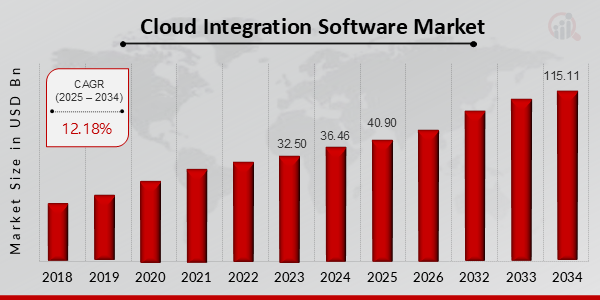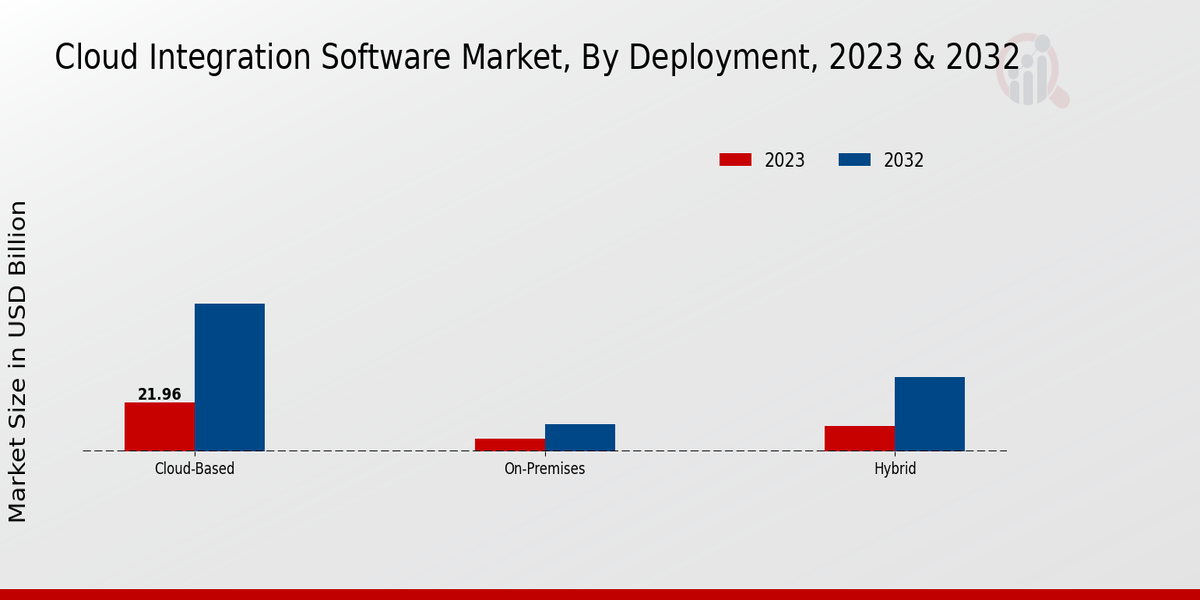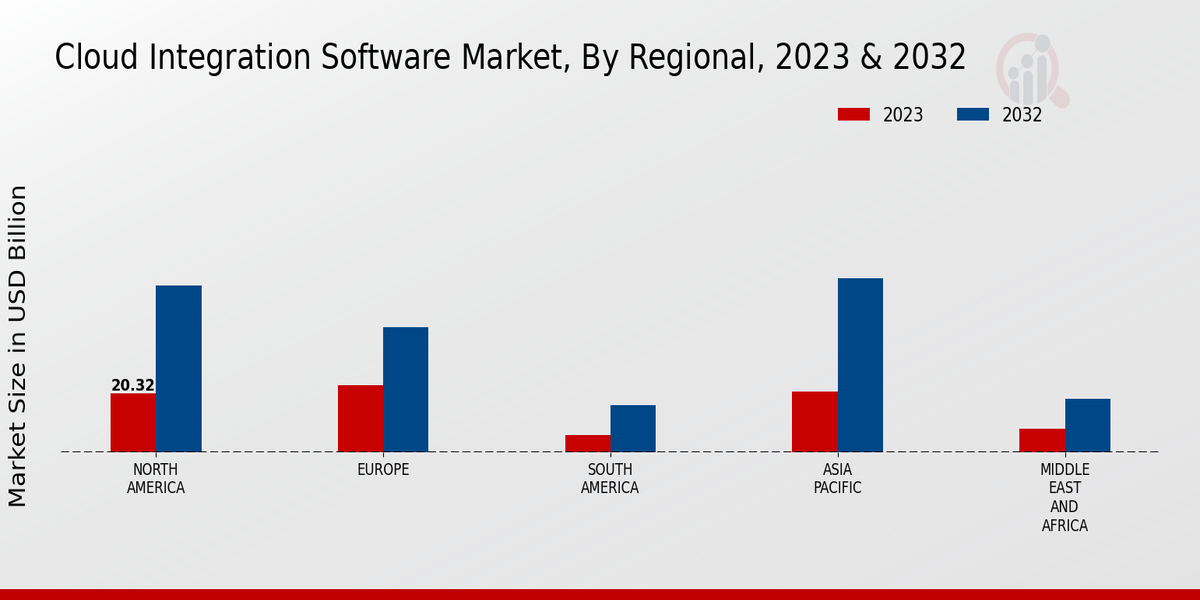Cloud Integration Software Market Overview
Cloud Integration Software Market is projected to grow from USD 40.90 Billion in 2025 to USD 115.11 Billion by 2034, exhibiting a compound annual growth rate (CAGR) of 12.18% during the forecast period (2025 - 2034).
Additionally, the market size for Cloud Integration Software Market was valued at USD 36.46 billion in 2024.
Key Cloud Integration Software Market Trends Highlighted
Amidst the burgeoning digital landscape, the Cloud Integration Software Market continues to experience transformative advancements. Key market drivers include the escalating adoption of cloud computing, the proliferation of interconnected devices, and the need for seamless data integration across disparate systems. This has led to a surge in the demand for robust and scalable integration solutions.
Opportunities abound for innovative cloud integration platforms that offer enhanced security, real-time data connectivity, and automated workflows. Trends such as the convergence of cloud and edge computing, the rise of serverless architectures, and the growing adoption of artificial intelligence (AI) are shaping the future of the market. By leveraging AI and machine learning, integration platforms can autonomously adapt to changing business requirements, improving efficiency and reducing operational costs.
Figure 1: Cloud Integration Software Market Size, 2025-2034 (USD Billion)

Source: Primary Research, Secondary Research, Market Research Future Database and Analyst Review
Cloud Integration Software Market Drivers
Rising Need for Seamless Data Integration
The increasing volume of data generated by businesses across various industries is driving the demand for cloud integration software. Organizations are looking for ways to consolidate data from multiple sources, such as CRM, ERP and marketing automation systems, to gain a comprehensive view of their operations. Cloud integration software provides a centralized platform for data integration, eliminating the need for manual data entry and ensuring data accuracy and consistency. By seamlessly integrating data, businesses can improve decision-making, enhance operational efficiency and gain a competitive advantage in the Cloud Integration Software Market Industry.
Growing Adoption of Cloud-Based Applications
The rapid adoption of cloud-based applications, such as SaaS, PaaS and IaaS, is fueling the growth of the Cloud Integration Software Market Industry. Cloud-based applications offer businesses greater flexibility, scalability and cost-effectiveness compared to on-premises solutions. They also eliminate the need for organizations to invest in hardware and software infrastructure, making it easier for them to integrate applications and data. Cloud integration software plays a crucial role in connecting cloud-based applications, enabling seamless data exchange and ensuring that businesses can leverage the full potential of cloud computing.
Increasing Demand for Real-Time Data Integration
Businesses are increasingly recognizing the importance of real-time data integration to gain timely insights into their operations. Traditional data integration methods can be time-consuming and often result in data latency. Cloud integration software provides real-time data integration capabilities, allowing businesses to access and analyze data as soon as it is generated. This enables organizations to make informed decisions, respond quickly to changing market conditions, and optimize their business processes in the Cloud Integration Software Market Industry.
Cloud Integration Software Market Segment Insights
Cloud Integration Software Market Deployment Insights
The deployment segment of the Cloud Integration Software Market is categorized into cloud-based, on-premises and hybrid. Among these, the cloud-based segment held the largest market share in 2023 and is projected to maintain its dominance throughout the forecast period. Cloud-based deployment offers several advantages, including scalability, flexibility and cost-effectiveness. It eliminates the need for businesses to invest in on-premises infrastructure and IT resources, making it a compelling option for organizations of all sizes. The on-premises segment, while accounting for a smaller market share, is expected to experience steady growth during the forecast period.
On-premises deployment provides organizations with greater control and security over their data and applications. It is often preferred by organizations with sensitive data or those operating in highly regulated industries. The hybrid segment, which combines elements of both cloud-based and on-premises deployment, is gaining traction as organizations seek to optimize their IT infrastructure.
Hybrid deployment allows organizations to leverage the benefits of cloud computing while maintaining control over critical applications and data on-premises. The growth of the cloud integration software market is driven by several factors, including the increasing adoption of cloud computing, the need for seamless integration between disparate systems, and the growing demand for data-driven insights. The market is expected to witness significant growth in the coming years, with the cloud-based deployment segment continuing to lead the way. Key players in the cloud integration software market include Informatica, IBM, SAP, Oracle and Microsoft, among others.

Source: Primary Research, Secondary Research, Market Research Future Database and Analyst Review
Cloud Integration Software Market Data Source Insights
The Data Source segment plays a crucial role in the Cloud Integration Software Market, influencing market growth and segmentation. Cloud Applications held the largest revenue share in 2023, owing to the increasing adoption of cloud-based services and the need for seamless integration with on-premises systems. On-premises applications are expected to witness steady growth due to the presence of legacy systems and the need for secure data management. IoT Devices are gaining traction as businesses seek to connect and integrate data from various devices for better decision-making.
The integration of data from IoT devices is becoming increasingly important for industries such as manufacturing, healthcare and transportation.
Cloud Integration Software Market Integration Type Insights
The Cloud Integration Software Market is segmented by Integration Type into Data Integration, Application Integration and Process Integration. Among these, Data Integration held the largest market share in 2023, accounting for around 40% of the Cloud Integration Software Market revenue. This dominance is attributed to the growing need for organizations to integrate data from various sources to gain a holistic view of their operations. Application Integration is projected to witness the highest growth rate during the forecast period, owing to the increasing adoption of cloud-based applications and the need to seamlessly integrate them with on-premises systems.
Process Integration, on the other hand, is expected to grow steadily, driven by the need for organizations to automate and streamline their business processes.
Cloud Integration Software Market Industry Vertical Insights
The Cloud Integration Software Market is segmented by Industry Vertical into Financial Services, Healthcare, Manufacturing and Retail. Among these segments, the Financial Services segment is anticipated to hold the largest market share in 2023, with a significant revenue contribution. The Healthcare segment is projected to exhibit the fastest growth rate during the forecast period, owing to the rising adoption of cloud-based solutions in the healthcare industry. The Manufacturing segment is expected to account for a substantial market share, driven by the increasing need for automation and efficiency in manufacturing processes.
The Retail segment is anticipated to witness steady growth, supported by the growing adoption of e-commerce and the need for seamless integration between online and offline channels.
Cloud Integration Software Market Organization Size Insights
The Cloud Integration Software Market is segmented by organization size into Small and Medium-sized Enterprises (SMEs) and Large Enterprises. SMEs are expected to hold a larger market share in 2023 due to their increasing adoption of cloud-based solutions to improve operational efficiency and reduce costs. The SME segment is projected to reach a market size of USD 14.6 billion by 2023, growing at a CAGR of 13.2%.
Large enterprises, on the other hand, are expected to witness a steady growth rate, owing to their focus on digital transformation and the need for robust integration solutions to connect disparate systems and applications. The large enterprise segment is expected to reach a market size of USD 18.9 billion by 2023, growing at a CAGR of 11.5%.
Cloud Integration Software Market Regional Insights
The Cloud Integration Software Market segmentation by region is expected to reach USD 81.5 billion by 2032, exhibiting a CAGR of 12.18% during the forecast period. North America is expected to hold the largest market share, owing to the presence of major cloud service providers and early adoption of cloud-based technologies. Europe is expected to follow North America, driven by the increasing adoption of cloud-based solutions and government initiatives promoting digital transformation. The APAC region is expected to witness significant growth, fueled by the rising adoption of cloud-based services and the increasing number of startups and SMEs.
South America and MEA are expected to experience steady growth, driven by the increasing demand for cloud-based solutions and the growing adoption of digital technologies.

Source: Primary Research, Secondary Research, Market Research Future Database and Analyst Review
Cloud Integration Software Market Key Players And Competitive Insights
Major players in Cloud Integration Software Market industry are focusing on developing innovative solutions to meet the evolving needs of customers. Leading Cloud Integration Software Market players are investing heavily in research and development to stay ahead of the competition. The Cloud Integration Software Market development is being driven by the increasing adoption of cloud computing and the need for seamless integration of different applications. The Cloud Integration Software Market Competitive Landscape is expected to remain fragmented in the coming years, with a number of small and medium-sized players competing for market share.
Salesforce is a leading provider of cloud-based customer relationship management (CRM) software. The company's cloud integration software, Salesforce Integration Cloud, helps businesses connect their CRM system with other applications and data sources.
Salesforce Integration Cloud is a powerful tool that can help businesses improve their customer service, sales and marketing operations. The company has a strong track record of innovation and has been recognized as a leader in the cloud integration software market. Salesforce is well-positioned to continue to grow its market share in the coming years. Oracle is a leading provider of database software and enterprise software. The company's cloud integration software, Oracle Integration Cloud, helps businesses connect their applications and data sources in the cloud.
Oracle Integration Cloud is a comprehensive solution that can help businesses improve their operational efficiency and agility. The company has a strong presence and a large customer base. Oracle is well-positioned to continue to grow its market share in the cloud integration software market.
Key Companies in the Cloud Integration Software Market Include:
Cloud Integration Software Market Industry Developments
The cloud integration software market is projected to reach USD 81.5 billion by 2032, exhibiting a CAGR of 12.18% from 2024 to 2032. The market has witnessed significant growth due to the increasing adoption of cloud-based solutions, the need for data integration, and the rise of hybrid and multi-cloud environments. Key players in the market include IBM, Oracle, Microsoft, SAP and Informatica. Recent developments include IBM's acquisition of Instana, a leading provider of application performance monitoring solutions and Oracle's launch of Oracle Integration Cloud 2.0, which offers enhanced data integration and automation capabilities.
The market is expected to continue to grow as organizations seek to optimize their IT systems and improve operational efficiency.
Cloud Integration Software Market Segmentation Insights
-
Cloud Integration Software Market Deployment Outlook
-
Cloud-Based
-
Cloud Integration Software Market Data Source Outlook
-
Cloud Applications
-
Cloud Integration Software Market Integration Type Outlook
-
Data Integration
-
Cloud Integration Software Market Industry Vertical Outlook
-
Financial Services
-
Cloud Integration Software Market Organization Size Outlook
-
Small and Medium-sized Enterprises (SMEs)
-
Cloud Integration Software Market Regional Outlook
-
North America
| Report Attribute/Metric |
Details |
|
Market Size 2024
|
36.46 (USD Billion)
|
|
Market Size 2025
|
40.90 (USD Billion)
|
|
Market Size 2034
|
115.11 (USD Billion)
|
|
Compound Annual Growth Rate (CAGR)
|
12.18% (2025 - 2034)
|
|
Report Coverage
|
Revenue Forecast, Competitive Landscape, Growth Factors, and Trends
|
|
Base Year
|
2024
|
|
Market Forecast Period
|
2025 - 2034
|
|
Historical Data
|
2019 - 2023
|
|
Market Forecast Units
|
USD Billion
|
| Key Companies Profiled |
Informatica, Oracle, Microsoft, Jitterbit, Workato, SAP, Boomi, IBM, Salesforce, SnapLogic, Tibco Software, Dell Boomi, MuleSoft, AgilePoint, Celigo |
| Segments Covered |
Deployment, Data Source, Integration Type, Industry Vertical, Organization Size, Regional |
| Key Market Opportunities |
Increased cloud adoption Hybrid cloud adoption Growing demand for data integration Rise of SaaS applications Adoption of IoT and Edge computing |
| Key Market Dynamics |
Rising hybrid cloud adoption Increased demand for data integration Growing adoption of SaaS applications Need for improved IT efficiency Increasing adoption of AI and ML in integration processes |
| Countries Covered |
North America, Europe, APAC, South America, MEA |
Frequently Asked Questions (FAQ):
The Cloud Integration Software Market was anticipated to reach a valuation of 40.90 billion USD in 2025.
The market is expected to grow at a CAGR of 12.18% from 2025 to 2034.
North America is projected to dominate the market in 2025.
Increasing adoption of cloud computing, need for improved data integration, and rising demand for automation are major factors driving market growth.
The banking, financial services, and insurance (BFSI) industry is anticipated to have the highest demand for cloud integration software in 2023.
Key players include IBM, Oracle, SAP, Microsoft, Informatica, Talend, Dell Boomi, Mulesoft, Tibco Software and Software AG.
The market is projected to reach a valuation of 115.11 billion USD by 2034.
Asia Pacific region is expected to exhibit the highest growth rate during the forecast period.
Growing popularity of SaaS-based integration solutions, increasing adoption of microservices architecture, and rising demand for real-time data integration are key trends influencing the market.
Security concerns, lack of skilled professionals, and complex integration processes are some of the challenges faced by the market.

















